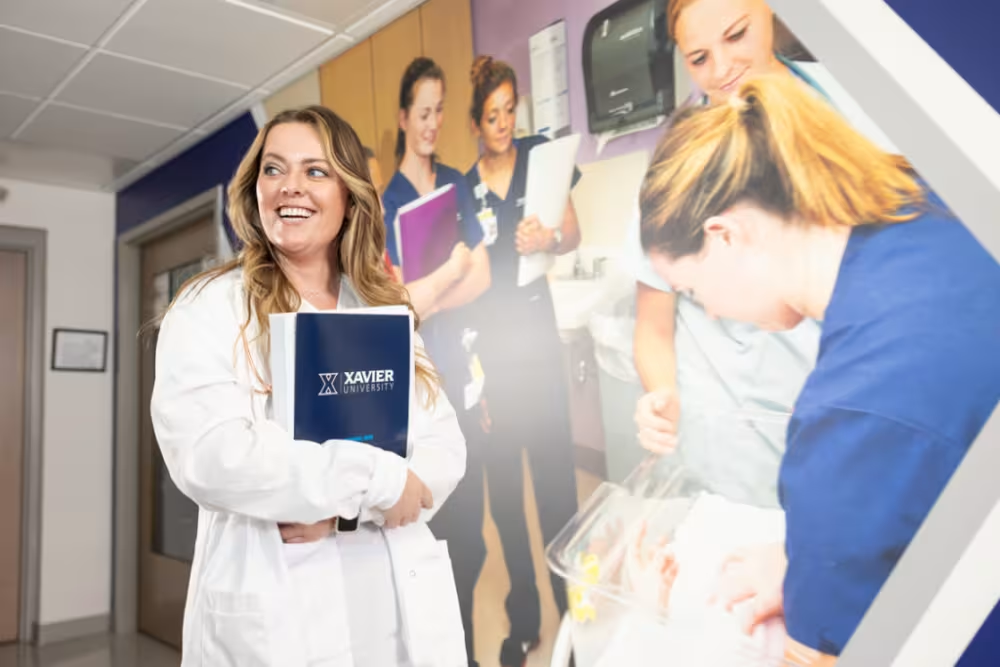Networking in Nursing: A Guide for Nursing Students and Future Nurses
As a nursing student, you’ll undoubtedly focus most of your attention on coursework, studying, preparing for the NCLEX and refining your nursing skills during labs. […]
Each blog post is dated and contains accurate information as of that date. Certain information may have changed since the blog post publication date. If you would like to confirm the current accuracy of blog information, please visit our ABSN program overview page or contact us at 866-890-9467.
Networking in nursing is good practice for students and licensed nurses. The benefits of networking in healthcare include supporting professional development, providing mentorship opportunities and obtaining career guidance. Students can start networking early by building connections with instructors, fellow cohort members and professionals during clinical rotations.

As a nursing student, you’ll undoubtedly focus most of your attention on coursework, studying, preparing for the NCLEX and refining your nursing skills during labs. While these tasks are important, there’s something you shouldn’t overlook: the benefits of networking in healthcare. Networking in nursing is beneficial for both nursing students and established professionals. Throughout your career, your professional network will help you grow as a nurse and advance your career trajectory.
At Xavier University, students in our Accelerated Bachelor of Science in Nursing (ABSN) program are encouraged to develop a professional network early. Our instructors go above and beyond to support our students’ success, both in academics and career growth. In addition to networking opportunities at our ABSN learning centers in Cleveland and Columbus, Ohio, you’ll be able to connect with working nurses and other healthcare professionals during clinical rotations at top local healthcare facilities.

Second-degree nursing programs can be a great choice for career changers.
Take a look at why it’s important to build a professional network as a nurse. Then, consider the steps you can take to start doing so as a student, and then later as a licensed registered nurse (RN).
The Importance of Networking in Healthcare
To understand why networking is important, it’s helpful to think about it in terms of your goals. While everyone has unique goals, there are some commonalities among nursing students and nurses.
Benefits of Networking for Nursing Students
A nursing student’s goals generally include performing well in nursing school to reach graduation, figuring out which nursing career path suits them best and increasing the chances of obtaining a job soon after getting licensed. Building a professional network can help with all three of these goals.
Nursing students who network are more likely to find the support needed to navigate nursing school. Leaning on other cohort members, for example, can provide emotional support. It can also offer opportunities to form study groups, contributing to academic success.
Furthermore, building a professional network while still in school can help students connect to potential mentors. A mentor can provide guidance on career paths, options and requirements. A mentor may even offer job shadowing opportunities, so students can get an inside look at different nursing specialties beyond what’s available in clinical rotations.

Advantages of Networking for Professional RNs
Networking in nursing is also important for licensed nurses at all stages of their careers, from new graduates to experienced clinicians. The goals of working nurses will vary, but they may include refining nursing skills, accessing professional development opportunities, working toward career advancement or transitioning to a different nursing specialty. Networking can assist with all these.
The benefits of networking in healthcare include connecting to opportunities for coaching and mentoring for professional development. You can also turn to your network for guidance on pursuing career advancement, such as advice on different graduate-level nursing education programs. In addition, your contacts may offer insights on transitioning to a different nursing specialty, should you decide it’s time for a change.
How Nursing Students Can Start Networking Early
Given the importance of networking in healthcare, it’s best to get started before your career begins. Some strategies for networking while in nursing school include the following:
- Connect with your instructors. You’ll have opportunities to connect with instructors in the online discussion forums and during in-person learning components, such as labs. Be attentive and ask questions, and you may be able to count one or more of your instructors as professional contacts.
- Build relationships with fellow cohort members. Other graduates in your cohort will pursue nursing jobs both near and far. Later, they may connect you to career opportunities, and vice versa. Focus on building relationships now and keep in touch after graduation.
- Make a good impression during clinicals. Networking in nursing often takes place in healthcare settings. During clinicals, you’ll connect with all sorts of healthcare professionals. Make an effort to leave a great impression and prove yourself to be an ethical, responsible nurse candidate.

What do nursing schools look for in prospective nursing students?
Networking in Nursing as a Lifelong Career Strategy
If you devote time and energy to building your professional network while in nursing school, your connections may help you land your first nursing job. Yet, long after you accept your first job offer, your network can continue assisting your career trajectory and professional network. Continue to nurture your connections by keeping in touch and seeking opportunities to build new relationships.
Some strategies for networking as a working nurse include:
- Attending professional development events, including workshops, seminars and conferences
- Maintaining an active presence on social media sites while adhering to employer social media policies and HIPAA requirements
- Joining professional nursing organizations, such as the American Nurses Association (ANA)
- Serving as a nurse volunteer in your community, such as by working with a disaster relief organization or an outreach group for the unhoused population
- Making an effort to get to know others at your healthcare organization, including those with whom you may not work regularly
As you become a more experienced nurse, particularly if you achieve career advancement, it’s good practice to give back to the nursing community. Professional networking is a two-way street; just as others may guide and mentor you, you, too, will be expected to lift others in their careers. When you become an experienced clinician, you may decide to serve as a mentor to nursing students or recent graduates.
How an ABSN Program Supports Networking Opportunities
Xavier’s ABSN program strongly encourages our nursing students to begin building a professional network early. Our nursing instructors are highly accessible to our students, online and in person. Students may even find a mentor among our faculty.
In addition, Xavier’s ABSN program uses the cohort model of nursing education. This means you’ll progress through the curriculum with the same group of nursing students from enrollment to graduation. The cohort model provides opportunities for networking because it encourages relationship-building. Every student in a nursing cohort is a future nurse who may become an invaluable contact.
Lastly, Xavier offers clinical placements at local healthcare facilities. Through these experiential learning opportunities, students will connect with working nurses, hospital administrative staff and other healthcare professionals, any of whom may become a professional contact.

Follow a step-by-step guide that shows you how to get into nursing school.
Pursue Your Future in Nursing at Xavier University
Xavier University champions the success of our students. Our ABSN program provides a rigorous curriculum to prepare students for nursing excellence. The program can be completed in as few as 16 months, so you can switch careers more quickly. You can also get started sooner, thanks to our lack of a waitlist, three start dates per year and two enrollment locations in Cleveland and Columbus.
Contact an admissions adviser at Xavier today to get started.
